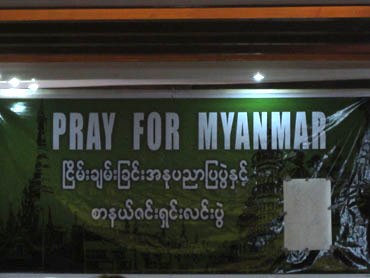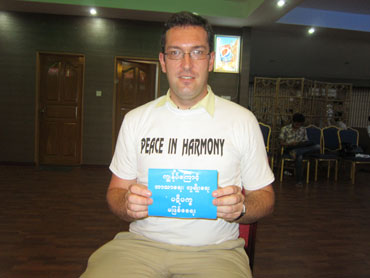Myanmar is on a knife-edge of hope and fear. The first signs of fragile freedom that have emerged over the last two years have given us hope. There is greater freedom of expression, the release of many political prisoners, preliminary ceasefires with most of the armed ethnic resistance organizations, more space for civil society and the media. For the first time in decades, there is a real chance of liberty and peace in the country. Yet all this is at risk now, with the rise of religious intolerance, hatred and violence which threatens to tear Myanmar apart.
 The mass killings of Muslims, the destruction or desecration of mosques and madrassahs, the burning of Muslim homes and properties, the looting of Muslim shops–these scenes have shocked and sickened us. It is time to speak out, for peace, respect for human dignity and human rights, religious freedom and inter-religious harmony.
The mass killings of Muslims, the destruction or desecration of mosques and madrassahs, the burning of Muslim homes and properties, the looting of Muslim shops–these scenes have shocked and sickened us. It is time to speak out, for peace, respect for human dignity and human rights, religious freedom and inter-religious harmony.
As Christians, we appeal to our Buddhist and Muslim brothers and sisters to work together to put an end to hatred, violence and discrimination. We appeal to people of all religions and none to look to the core teachings of their respective religions or philosophies, and live by the principles of “Metta” (loving kindness) and “Karuna” (compassion), “Salam” (peace), “love your neighbor as yourself” and “love your enemy”, and to basic common humanity.
In particular, we appeal to Buddhist monks around the country to use their “Taya Pwe” sermons not to incite hatred but instead to call for consideration, mercy and compassion towards Muslims. The voices of hatred, intolerance and violence are a minority, but they are vocal and violent. The silent majority needs to wake up, unite and say “no” to violence and hatred.
Pope Francis 1 recently called on Christians to be a “community of love”, “a community of open doors”, and “a community of ‘yes’” – saying yes to the positive opportunities that await us. We extend the Pope’s appeal to all the people of Myanmar. But in order to be a community of ‘yes’, with a positive view of the future for Myanmar, we need to be a people that says ‘no’ to hatred and violence.
In the immediate term, there is a very urgent need for some practical action. Firstly, the Government must deploy security forces, with strict orders to take action to stop violence, protect vulnerable communities and act with impartiality to maintain law and order.
It is clear from the violence in Meiktila and other places in Myanmar that the security forces have in many instances stood by and watched while Muslims are killed and properties burn. This cannot continue. As one young activist for peace said recently, the government must “do something effective, efficient and timely to protect the livelihood of every faith-based community”.
 Secondly, those who incite hatred and violence, or who perpetrate acts of violence, should be prosecuted and brought to justice. If Myanmar is to develop on the path to peace, prosperity and freedom, we cannot continue in a climate of impunity.
Secondly, those who incite hatred and violence, or who perpetrate acts of violence, should be prosecuted and brought to justice. If Myanmar is to develop on the path to peace, prosperity and freedom, we cannot continue in a climate of impunity.
Thirdly, we need serious investment in initiatives to promote religious harmony, inter-religious dialogue and peace. Religious leaders from all communities should speak out loudly and clearly against hatred, intolerance and violence, and should work together, with experts from around the world, to promote reconciliation. There are civil society organizations in Myanmar such as ‘Co-exist’, the Myanmar Youth Empowerment Organization and Religions for Peace who are already trying to develop initiatives to counter extremism and intolerance and promote harmony and peace.
A month ago, a coalition of young activists from different religious backgrounds organized a ‘Pray for Myanmar’ day. They had launched a sticker campaign to promote peace. As one of them said: “Hate speech is still circulating and we are trying to counter it. We can never get true peace without dialogue. Just posting stickers cannot bring harmony, but we want to post the stickers to our inner hearts and minds. It will take time. We must open our fists, show we are willing for peace, and start a conversation.”
If the scenes we have seen this week in Oakkan, and in Meiktila and elsewhere several weeks ago continue, not only will Myanmar’s hopes for freedom and peace be dashed, and the country torn apart, but there is a real danger of a new challenge arising: the threat of radical Islamism. Extremism breeds extremism, and the extremist Buddhist anti-Muslim violence could send Myanmar spiraling into a vicious cycle of religious extremism and violence. Muslims have lived peacefully in Myanmar for centuries. They are our brothers and sisters. We must all unclench our fists, extend an open palm, end the violence and begin the long hard work of reconciliation and reconstruction–before it is too late.
 Archbishop Charles Maung Bo is the Roman Catholic Archbishop of Yangon.
Archbishop Charles Maung Bo is the Roman Catholic Archbishop of Yangon.
 Benedict Rogers is East Asia Team Leader at the international human rights organisation Christian Solidarity Worldwide (CSW), and author of Burma: A Nation at the Crossroads. The views expressed in this article are the author's and do not reflect Mizzima editorial policy.
Benedict Rogers is East Asia Team Leader at the international human rights organisation Christian Solidarity Worldwide (CSW), and author of Burma: A Nation at the Crossroads. The views expressed in this article are the author's and do not reflect Mizzima editorial policy.


